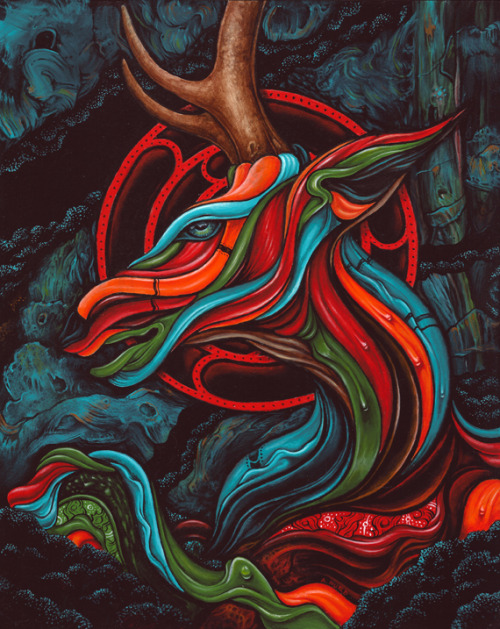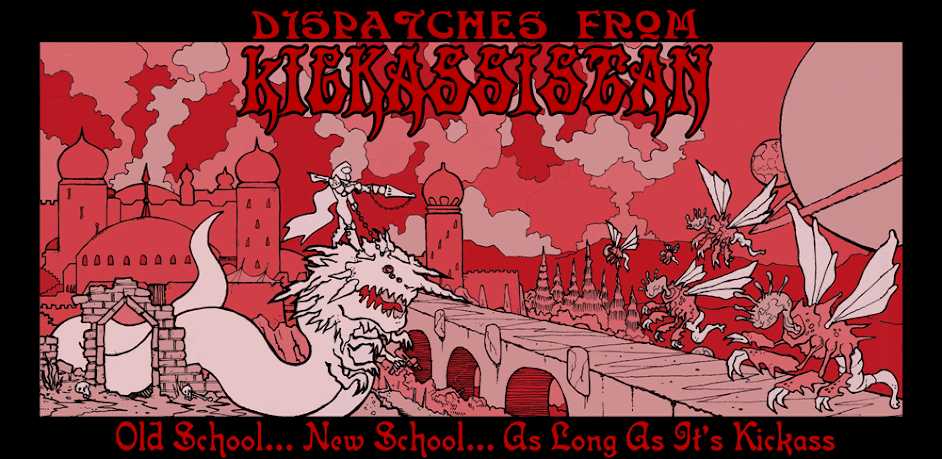The Stag-Headed God
The Forest-Walker, the Horned King, the Dying God, He Who Is Devoured, Lord of all Prey
Neutral Alignment
"All praise to Him who breeds the prey for our hunters, the plunder for our raiders, the Stag-Headed God who dies that we, His children, may live off His flesh! Praise to the gloried dead who found the death in the jaws of beasts and in the belly of beasts did they find their reward! Praise be to Horned King, the Dying God who rules all tribes of beasts and men but we, His children, to make them prey for us, and we honor His sacrifice by doing His will and taking from our prey." - Milk-Eye Vargun, hunter-shaman of the Skalls
"It is convenient, is it not, that the Skalls give themselves such a deity? A father-deity who wishes his children well and provides for them by ruling over the men and beasts of the world -- except for the Skalls themselves, mind you -- so that they may be made into worthy prey for the Skalls' collective rapine. We I to design a theology to justify my own avarice and violence, I could do no better." Master Guang-Yuan Jo, personal physician to the last Pascha of Ur-Hadad
 It is true that the Skalls only venerate gods of death, for they view death being the only aspect of life that is beyond man's control. Men can farm and raise cattle, thus gods of crops and flocks are unnecessary. It is the actions of men and women that create children, build homes and cook food, and thus gods of hearth, home and childbirth are redundant. Even war is something that man makes for himself. The one thing man has no control over is what happens to him after death, for once he is dead, he has lost all of his own power and thus it is that the Skalls only have death gods.
It is true that the Skalls only venerate gods of death, for they view death being the only aspect of life that is beyond man's control. Men can farm and raise cattle, thus gods of crops and flocks are unnecessary. It is the actions of men and women that create children, build homes and cook food, and thus gods of hearth, home and childbirth are redundant. Even war is something that man makes for himself. The one thing man has no control over is what happens to him after death, for once he is dead, he has lost all of his own power and thus it is that the Skalls only have death gods.Each death god is tied to a manner of burial. The God of Blackened Skies is the god associated with cremation and the feeding of the dead to carrion birds. The God Under the Mountain is the god of the buried dead. Though there once was a god of the drowned dead, he betrayed the pantheon long ago and is considered anathema. But most strange among the gods of the Skalls is the Stag-Headed God, the god of those who have been devoured. It is honorable for a man to kill a stag, reason the Skalls, as it is honorable for a stag to die to feed the man, and so it is for a man to die to feed a beast. Such is the funeral rite of the Stag-Headed God.
Beyond burial practices, the Stag-Headed God plays an important part in the theology of the Skalls. The Dying God, they believe, is ruler of all things that live in the world -- except, of course, for the Skalls. The Skalls believe that no king may rule them, nor any god reign over them, but for other men and, indeed, for all the beasts of the earth (but not the water, it may be noted), the Stag-Headed God is king. The Skalls believe that the Dying God is to the men and beasts of the world as a shepherd, tending a flock, a flock that is being raised for a singular purpose: to be the prey of the Skalls. The beasts of Ore will be hunted by the Skalls, their meat to sate them, their skins to clothe them. The people of Ore will be raided by the Skalls, their treasures plundered, their lives forfeit. The Dying Gods' stewardship of his flocks is for one reason: to make the prey worthy game for the Skalls which, in turn, must make the Skalls worthy hunters.
 Skallic legend speaks of Krothi, a Skallic heroic figure who, on his way back from a war had been betrayed by his brother, the black-hearted villain Sthum. Left for dead on the banks of a vast lake, Krothi's body was washed down a river and into a deep forest. When Krothi woke, he found himself still injured and now starving in an unfamiliar land; since the gods of the Skalls do not reward inaction, Krothi dragged himself along on a broken leg, clutching the wound at his side. When he had found the herbs and mosses he needed to staunch the bleeding and had made a splint for his broken leg, Krothi encountered a vast stag with six antlers, four eyes and eight legs. The stag made as to charge Krothi, to gore him with his impossible rack of horn, but Krothi ducked, grasping an antler and yanking clean from the stag's head. As the stag barreled past him, Krothi dug the sharp broken end of the antler into the stag's side, wounding it deeply. The stag was routed, but Krothi was hungry, and so followed the trail of blood to the place where the stag lay dying. Krothi let slip his hand from the wound that Sthum had given him and snapped the stag's neck. Having no tools with which to make fire, no patience for such civilities, Krothi ate his fill of the dying stag's flesh, for he had earned it.
Skallic legend speaks of Krothi, a Skallic heroic figure who, on his way back from a war had been betrayed by his brother, the black-hearted villain Sthum. Left for dead on the banks of a vast lake, Krothi's body was washed down a river and into a deep forest. When Krothi woke, he found himself still injured and now starving in an unfamiliar land; since the gods of the Skalls do not reward inaction, Krothi dragged himself along on a broken leg, clutching the wound at his side. When he had found the herbs and mosses he needed to staunch the bleeding and had made a splint for his broken leg, Krothi encountered a vast stag with six antlers, four eyes and eight legs. The stag made as to charge Krothi, to gore him with his impossible rack of horn, but Krothi ducked, grasping an antler and yanking clean from the stag's head. As the stag barreled past him, Krothi dug the sharp broken end of the antler into the stag's side, wounding it deeply. The stag was routed, but Krothi was hungry, and so followed the trail of blood to the place where the stag lay dying. Krothi let slip his hand from the wound that Sthum had given him and snapped the stag's neck. Having no tools with which to make fire, no patience for such civilities, Krothi ate his fill of the dying stag's flesh, for he had earned it.The legends differ as to what happened next, but the point the story is the same: by refusing to die and being worthy of the beast that the Stag-Headed God set before him, Krothi was able to survive. In some stories, the Stag-Headed God is the stag fought by Krothi, and when he kills Him, Krothi becomes the new Stag-Headed God, for the Dying God must always die. In other stories, the stag is kin to the Horned King, who grants Krothi his blessing for defeating his champion. In still others, the Stag-Headed god was indeed the stag Krothi fought, but the Dying God returns to him as a ghost as he sleeps, and bears him home to his tribe, where he has earned the right to face his brother-betrayer, Sthum.
Of all the Skallic gods, the Stag-Headed God is the one least-likely to be worshiped by non-Skalls, at least in the form that Skalls recognize. Skallic shamans, however, point to the number of horned divinities in other pantheons as proof of the pervasiveness of worship of the Horned King among the "lesser races of men." Among the Skalls, the priests of the Stag-Headed God are more akin to the shamans and druids of other religions. To most folk of Ore, the Stag-Headed God is less than a rumor, less than a myth; to any who survive an onslaught of Skalls, the name bears dread and doom, for Skallic warriors routinely make thanks to him during raid and rapine. Ecstatic praise and thanks that the Stag-Headed Gods has seen their deeds and deemed them worthy of such slaughter.

